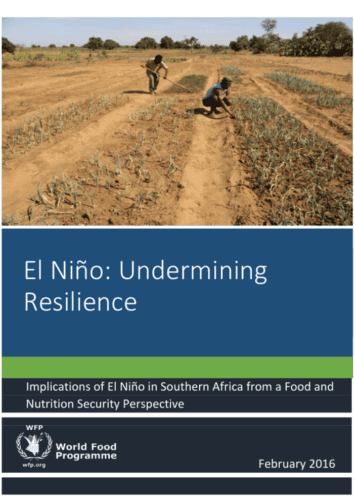Attachments
Executive Summary
Southern Africa’s unprecedented El Niño-related drought and weather-related stress has triggered a
second shock-year of hunger and hardship for poor and vulnerable people with serious consequences
that will persist until at least to the next harvest in 2017. It is evident that the 2015-16 maize harvest
will be insufficient to cover full cereal needs for the region without significant importation.
El Niño conditions have caused the lowest recorded rainfall between October 2015 and January 2016
across many regions of Southern Africa in at least 35-years. The period also recorded the
hottest temperatures in the past 10 years. Short-term forecasts, based on more recent data, (February
to May) indicate the high probability of continuing below-normal rainfall across the region, signalling
this may become one of the worst droughts in recent history.
El Niño’s impact on rain-fed agriculture is severe. Poor-rainfall, combined with excessive
temperatures, has created conditions that are unfavourable for crop growth in many areas. In Lesotho,
South Africa, Swaziland, Zambia and Zimbabwe, planting was delayed by up to two months or more
and is expected to severely impact maize yields. As the window for planting is now closed, even good
late rainfall offers limited scope for recovery.
Already an estimated 15.9 million people in southern Africa are highly food insecure, not including a
growing number in South Africa. Zimbabwe, Malawi, Lesotho, Madagascar were the hardest
hit from the 2015 poor harvest and early impacts from El Niño. Other countries, including Swaziland,
Angola and Mozambique show increasing signs of concern.
More than 40 million rural and 9 million poor urban people are at risk due to the impacts of El Niño’s
related drought and erratic rainfall. Small-scale farmers will be particularly hard hit by a
second successive poor harvest. Food price inflation will also impact low-income households.
Limited water availability and poor pasture are worsening livestock conditions. The number of
livestock deaths is already increasing in parts of Botswana, Lesotho, Namibia, South Africa, Swaziland and Zimbabwe. Critical water shortages have also impacted rural communities’ water availability and sanitation, impacting nutrition and health of both humans and animals.
Maize prices continue to rise well above their five-year average. In South Africa, spot prices have more than doubled compared to the five-year average. The July 2016 futures price for South African white maize is at a record high indicating the tightness of regional supply.
El Niño is usually accompanied by economic slowdown in Southern Africa, associated with reduced
agricultural output and contraction in industrial activities. Current macro-economic conditions,
including falling international commodity prices and currency depreciations, may inhibit countries’
capacity to secure sufficient food supply.
This consecutive second year of inadequate food production will inflict severe consequences. Crop
failure and economic contraction threaten both rural and urban livelihoods as it undermines people’s
capacity to meet their basic social and economic needs. Coupled with increasing levels of livelihood
stress and unemployment, El Niño incurs social, economic and political consequences.
National governments and regional bodies recognize that the El Niño crisis demands immediate
attention. Regional coordination and government leadership of critical contingency, preparedness and
response planning is crucial to guarantee sufficient food supply and access for the most vulnerable
people.
El Niño is progressing toward a potential regional emergency requiring a coordinated response.
Source link : https://reliefweb.int/report/world/el-ni-o-undermining-resilience-implications-el-ni-o-southern-africa-food-and-nutrition
Author :
Publish date : 2016-03-01 08:00:00
Copyright for syndicated content belongs to the linked Source.
